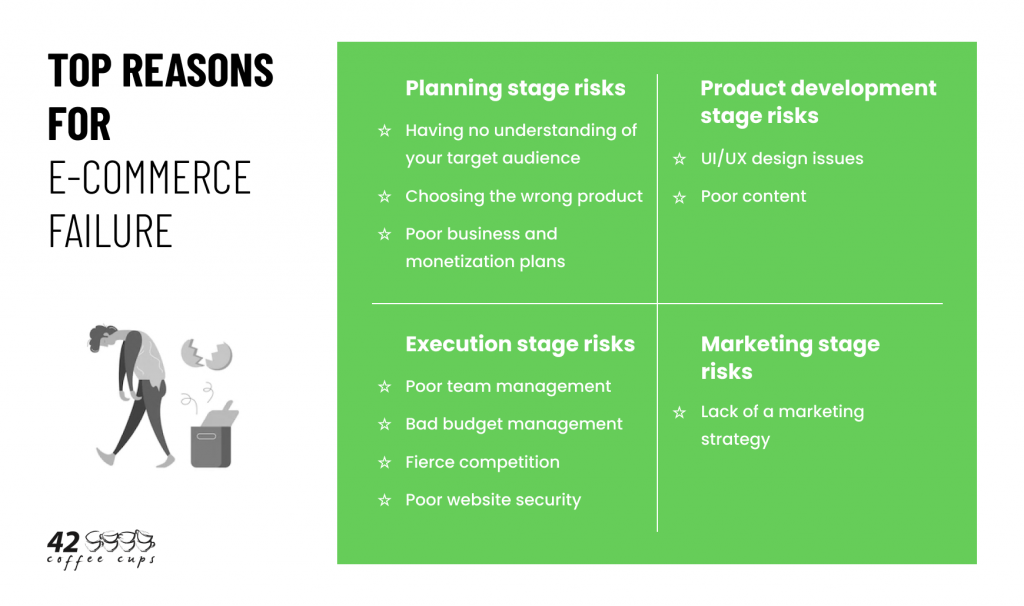Over 90% of e-commerce startups fail within the first three months of operation. Companies can face difficulties that may lead them to failure at every stage of the development process.
The riskiest aspects of e-commerce business development involve the following phases:
- Planning
- Product development
- Execution
- Marketing
Let’s outline the most common and crucial reasons for e-commerce startup failure at each of these stages and the ways to prevent them.

Top Reasons for E-Commerce Failure and Ways To Prevent Them
Planning stage risks
- Having no understanding of your target audience
Your primary goal as a business owner is to fulfill your customers’ needs and wants. However, you can’t achieve this if you don’t know the specific traits of the audience you’re targeting.
Before developing your e-commerce business, make sure to perform in-depth target audience (TA) research and analysis to know your customers better. With this knowledge, you’ll be able to sell your products or services more effectively and ensure that your future business processes align with your TA.
- Choosing the wrong product
Selling the first available product won’t automatically make your e-commerce startup successful. To achieve superior results, you must conduct market research and competitor analysis to define your target audience’s pain points and come up with ideas for products that will help to resolve them.
- Poor business and monetization plans
A startup that lacks a good monetization plan won’t result in a profitable business. Typically, a startup can survive the critical first 5 to 10 years with a solid business plan. Even when an online store reaches a sufficient level of growth and receives stable profits, its owner must constantly reinvent the business with new products and work to increase market share. A good business plan will address all this.
Product development stage risks
- UI/UX design issues
38% of visitors leave a website if they feel the layout is unattractive. Quite a significant rate. So, having a well-designed online store to make a brand distinctive and retain users is critical for every business, not just for e-commerce. An excellent e-commerce website should be clear, convenient, usable, secure, responsive, and quick. Conduct a usability test to ensure that your platform has no flaws and is optimized appropriately.
- Poor content
Even if you offer the most outstanding, in-demand products, you won’t be able to maximize revenues until you present awesome content. Low-quality visuals and text not only harm your site’s search ranking but also discourage people from clicking to learn more about your offerings.
High-quality, engaging content is an essential component of a successful e-commerce website. Appealing and informational product descriptions, photos, videos, and blog posts will help your site stand out and convert more visitors into buyers.
Execution stage risks
- Poor team management
A lack of clear organization and attention to the hiring process can become a serious problem. Most e-commerce startups fail because they don’t devote the time to put together a team of competent specialists ready to deliver results.
To avoid team management issues, startups should hire such core experts as a project manager, account manager, content specialist, designer, and developers.
- Bad budget management
70–75% of startups fail to repay the money they’ve invested. This all happens due to poor financing decisions. Your top priority should be smart budget management, which means you must maintain a clear understanding of your spending.
To get the best ROI in the early days, you need to think strategically about where to invest. Make sure to allocate a budget to such fundamental things as a good website, high-quality products, a proficient team, and effective marketing.
- Competition
19% of startups fail because they don’t take the competition seriously. Due to the number of market players, the likelihood of an e-commerce startup being outcompeted by others is quite high.
A combination of team expertise, product quality, and reasonable funding can all lead to the success of a startup. For that reason, you need to perform a competitor’s analysis before launching your business to define the areas where you can dominate your rivals and fill their gaps.
- Poor website security
With cyber threats lurking throughout web space at all times, it’s more crucial than ever to eliminate any security vulnerabilities. Make sure to regularly review, examine, and upgrade your security features.
Marketing stage risks
- Lack of a marketing strategy
Without a comprehensive marketing plan for bringing products to market, e-commerce startups usually invest in different advertising options randomly or don’t manage marketing at all.
To be effective in digital marketing, you need to build a strong web presence via social media, email marketing, PPC advertising, SEO-based content, and other marketing channels that work specifically for your business.
Conclusion
The unfortunate truth is that the majority of startups fail. But when you implement the best practices and avoid the risks outlined here, yours won’t be one of them. Remember that thorough research, attention to details, and a well-planned business and marketing strategy will guarantee the success of your e-commerce business.
42 Coffee Cups will gladly help you with the core component of your e-commerce startup development: building a high-performance, user-friendly, and attractive website that will be a real pleasure to interact with. Contact us for a custom quote.
